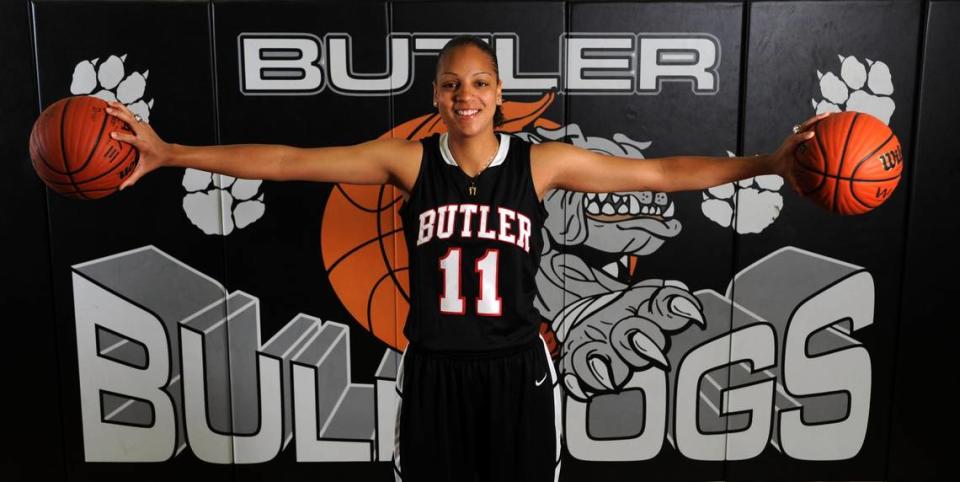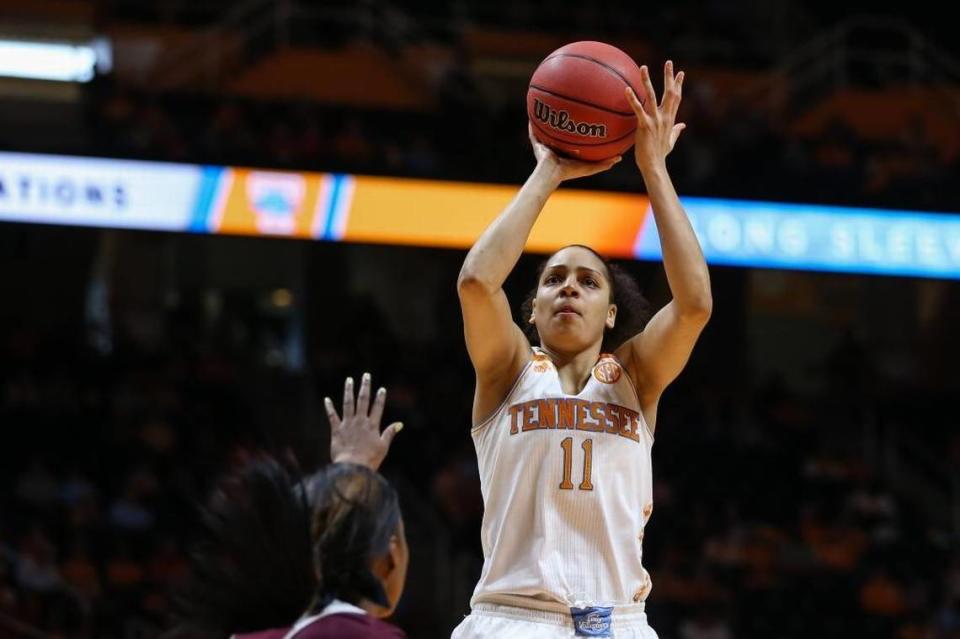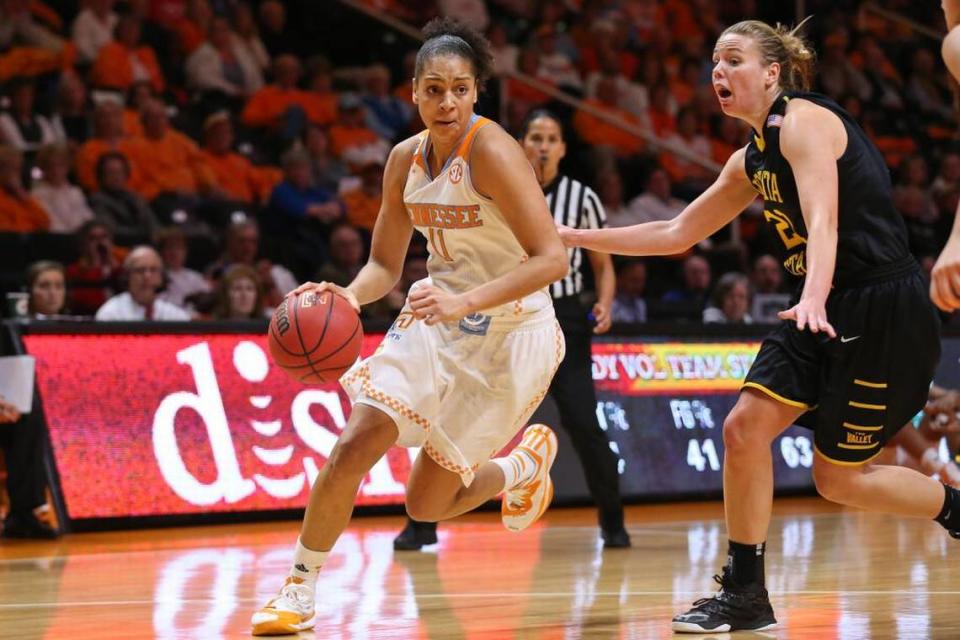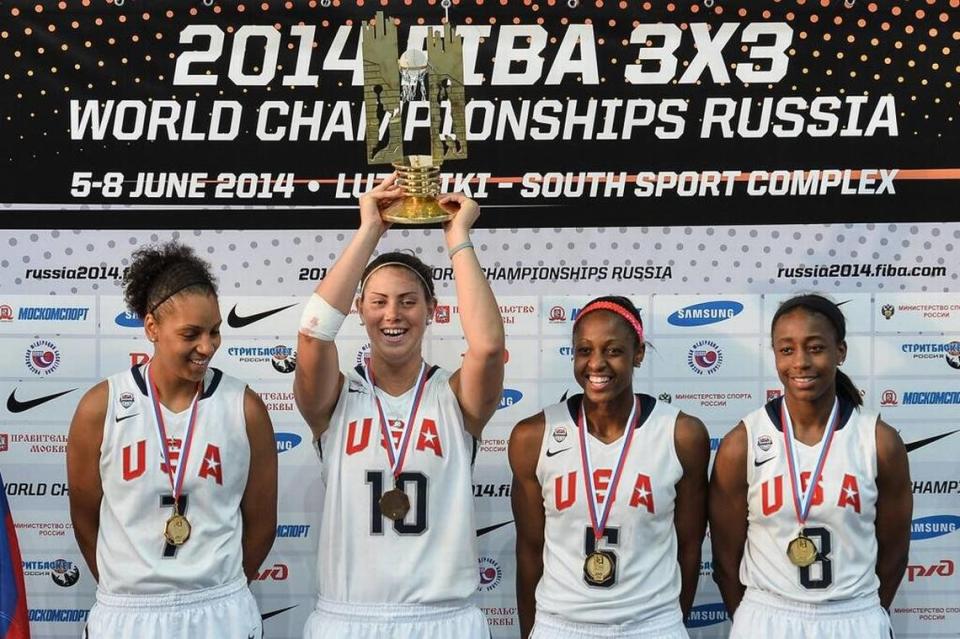Charlotte’s Cierra Burdick on preparing for Paris Olympics in 3x3 hoops, dreaming big
For the moment, Cierra Burdick is home in Charlotte.
But she’ll soon be off to Europe — representing home on the biggest stage.
Come July 30th, the Charlotte resident and former Butler High School phenom will be playing for the USA Basketball 3x3 Women’s National Team in the 2024 Paris Olympics. The event comes a year after Burdick won a gold medal at the 2023 FIBA 3x3 World Cup.
The Charlotte Observer’s Alex Zietlow spoke to Burdick over the phone, and the two discussed what it was like for her growing up in south Charlotte, the nuances of the 3x3 game and the importance of dreaming big.
She added that she hopes to make all of the people who helped raise her in her hometown proud: from her coaches (including former Butler HS coach Stephanie Butler-Graham who predicted she’d make the Olympics one day), to her teammates, to her family — including her maternal and paternal grandmothers, Queen Heard and Jane Burdick, who passed in the last two years and inspire her every day.
Per NBC, 3x3 basketball will air on NBC, USA Network, CNBC and E!, and it’ll also stream on Peacock and NBC Olympics platforms starting July 30.
Here’s the interview, which has been edited for clarity and brevity.

Cierra Burdick and basketball have been intertwined forever
Alex Zietlow: I know you’ve probably been asked this 100 times. But what does it mean to you to represent Team USA?
Cierra Burdick: I mean, that is a question I’ve been getting often. That, and ‘Am I nervous?’ And it’s such a surreal moment and situation for me, I still don’t think it’s totally set in. You know, maybe it’ll set in when I’m at Opening Ceremonies and I’m surrounded by the world’s greatest athletes and competitors. Maybe then it’ll begin to set in. But I think right now, I’m just so honed in and focused on my preparation and making sure that I’m the best version of myself come July 30th, when we play our first game.
And so I think a lot of my time and energy and focus is going to that right now. I think maybe when I get to Paris, and when we’re together as a team finally, I’ll realize the stakes and the moment, and the hype around it all. But I’m very much just trying to stay even-keeled right now, and enjoy the journey, and to really just make the most out of this once-in-a-lifetime experience.
AZ: What are you doing to prepare?
CB: I have a pretty strict workout regimen, but also making sure I get my rest and my recovery. Sleep is such a big part. It’s really hard when you’re jet-lagged. I’ve been in three different countries and two different continents in the past week and a half. But you know, just really making sure everything revolves around being the best athlete and teammate and leader and competitor I can be.
AZ: So you played any sport growing up but ultimately honed in on basketball around 12 years old. What drew you to the sport?
CB: I will turn the smallest game into the biggest competition. Even if it’s just like family Monopoly. And I think I just fell in love with all sports, to be honest. Everything I played at the Harris YMCA I loved. But basketball, the constant action. You know, when I was sitting in the goal at soccer games, I’d be hanging on the goalpost. It wasn’t enough action for me. And even in baseball, if I’m sitting at first base, if I’m not getting a hit toward me, I wasn’t involved enough.
But basketball was just constant activity, constant action, constant competitiveness. ... Still, when I get a chance, you know I like to play other sports, like leisurely.
AZ: Please don’t tell me you’re a pickleball person too.
CB: I have not picked up the pickleball yet. (Laughs.) I have not! But I will still very much go throw the football or the baseball, and you know, ride bikes and go skating. All that stuff.

Getting introduced to Team USA Basketball
AZ: So you were a McDonald’s All-American coming out of Butler High School. You played for the late, great Pat Summit at Tennessee. You got drafted by the Los Angeles Sparks and now play pro ball overseas. All of this is the 5-on-5 game. How’d you get into the 3x3 space? When did that come together?
CB: It was in 2014. Carol Callan was the head of USA Basketball at the time. She basically called me and asked me if I’d be interested in representing USA Basketball in the World Cup in Moscow, Russia. And I’ve never said no to USA Basketball, and I’ve never said no to Carol Callen. I would literally trust her with my life. So I owe a lot of gratitude to her for actually getting me into the 3x3 space. And it was actually on that roster, it was myself and Tiffany Mitchell, a Charlotte legend, and Jewell Loyd, who’s obviously a future Hall of Famer, plays in Seattle right now, and Sara Hammond, who has since retired. And it was the four of us. And we went to Colorado Springs, had a few days of training camp, played in a local tournament, and then off we went to Moscow, Russia, to play in the World Championship there.

To be completely honest, the game has come a long way since then. When we were playing in Moscow, we just relied strictly on our skill and our athleticism. There wasn’t a lot of strategy or scheming behind it. But then I think I realized, ‘Hey, this kind of fits my style of play. I’m very much a cerebral player.’ Basketball IQ is one of my strengths. I love the fact that you actually don’t have a coach during the game, that you kind of have to coach yourselves, so all adjustments are being made on your own.
These were all things that just played into my hand, played into my cards as a player. Just the versatility that you need to be able to play 3x3, you gotta be able to defend everybody, and then offensively, you gotta be able to do a little bit of everything. So that’s always kind of been my game. I’m not great at any one specific skill, except for maybe rebounding, but I can do a little bit of everything. And that definitely helps in the 3x3 game.

The nuances of 3x3 basketball
AZ: So I’m watching a few clips of you playing 3x3 ball. The game has a few noticeable differences. Among them: the ball goes through the net, and you immediately match up with someone.
CB: Correct. It’s continuous play.
AZ: Can you explain that to me?
CB: So continuous play is ... Actually, I’ll just give you a little run down.
AZ: Would love that.
CB: So the game is 10-minute regulation or first to 21. Three-point shots are worth two, 2-point shots are worth one. And then, the play is continuous, so the ball goes through the net, and as soon as you secure the made basket or the rebound, you then have to clear it past the 3-point line, and then play is live.
As soon as you gain possession of the ball, the shot-clock starts. So you got 12 seconds to clear it, get into some type of action, and then score. So it’s super fast paced. It’s super physical. It’s honestly like a 10-minute sprint. And every single time I play, I’m like, ‘Why do I do this to myself?’ (Laughs.) Because it’s way more exhausting and painful than 5-on-5 just for the simple fact that there are no breaks. You get one time out per game, and it’s a 30-second time out. And the continuous play is just so taxing on your lungs. Yes, you’re playing half-court, but you’re moving for 10 minutes straight with very little to no breaks.
AZ: Does the clock stop when the ball goes through the basket?
CB: No.
AZ: That’s tough.
CB: So the clock stops only on dead balls: so if the ball goes out of bounds or if there is a free throw.
AZ: And that was going to be the next question I shed my ignorance on: When you get fouled in the act of shooting, you get one free throw, right?
CB: Correct. Unless you get fouled on a 3-point shot. Obviously you can’t foul out, but once you have seven team fouls, you’re in the bonus, so then you’re shooting two free throws. Once you get 10 team fouls, you’re shooting two free throws, and you get the ball back. So the strategy behind your fouls is super important to the game.
AZ: I would imagine it would be difficult to get up to seven fouls in 10 minutes, no?
CB: Uhhhhhhhh. (Laughs.) You don’t know how physical these games are!
The goal for Paris Olympics is simple
AZ: So you’ve accumulated so many accolades in the 3x3 space. It made me think of a question: Have you ever lost a 3x3 game?
CB: (Laughs.) Yes. It was actually my first time with USA Basketball that I did not bring home a gold medal. It was 2022 in the 3x3 World Cup in Belgium. And that was a really tough summer. ... So that was the worst finish I had ever had at a national team event with USA Basketball. It honestly stuck with me for that entire year until I could get back to the World Cup in 2023 and kind of have some redemption.
AZ: What’d you learn from that experience?
CB: That sometimes you lose. (Laughs.) I think it just made me hungrier. I remember making a post after that World Cup, expressing my gratitude to USA Basketball for the opportunity to represent my country on the world stage. I think I even said in my post, ‘God willing, I’ll be back.’ And not even a year later, I was back, and we came back with a vengeance, and we were the best team in the world. Once bracket play hit, we were hitting our peak, and I honestly believe that there was no team that could beat us.
AZ: I think someone who hasn’t played 3x3 basketball might think: As long as my three players are better than your three players, we’ll win. I’m thinking that’s overly reductive. What do you think? Is there less variability in 3x3 than in 5x5?
CB: No. I think it’s the exact opposite, honestly.
AZ: Oh interesting. Tell me.
CB: Because 3x3 is such a small, nuanced sport, you can take four WNBA players and have them play against four experienced 3x3 pros, and I’m willing to bet that the 3x3 pros win. And it’s because of the amount of little nuances that the 3x3 game present. So whereas 5x5, we are still very much a dominant country on the world stage at 5x5. On the women’s side, we have the best players in the world, and we are so deep that we never rebuild, we’re just reloading. And so our 5x5 team can get away with practicing for two weeks before the Olympics. ...
Whereas with 3x3, because of the type of sport that it is, and so much of it depends on experience and chemistry, you can’t just throw four of the best players together and expect them to go out and do well. Now, granted, that’s what the U.S. does, because timing wise, with the WNBA, we don’t have any other choice, but these other countries have been playing and training together for a year or a year and a half. So we’re at an extreme disadvantage, which I don’t think people fully realize.
Like, we’re going to have only 10 days of practice together before our first game in the Olympics, whereas we’re playing against teams who’ve been together for a year-plus. So our ability to learn on the fly, to build chemistry extremely fast, and to adapt and adjust every single game is going to be crucial.

What young Cierra Burdick might say...
AZ: What would you tell a young Cierra Burdick, if you could, as you prepare for this experience in Paris?
CB: I mean, young Cierra was super arrogant and cocky. (Laughs.) So she would’ve been like, ‘Ah heck yeah, you’re going to be in the Olympics!’ But you know, life humbled me a little bit, and now I’m much more modest. So now it’s just about being overwhelmed with gratitude, really.
But I think I would just tell young Cierra to keep working: ‘You love this game this so much. And the time and the work that you’ve invested into it will all pay off. It may not look exactly like how you thought it was going to look. But it’s so much sweeter the way that it turns out.’ So I’d tell her to keep her loved ones tight; her support system will definitely carry her through all of this. And to keep working hard, and to just enjoy every step of the journey.
To continue to dream big, work hard and enjoy the people you get to go on the journey with.

 Yahoo Sports
Yahoo Sports 
